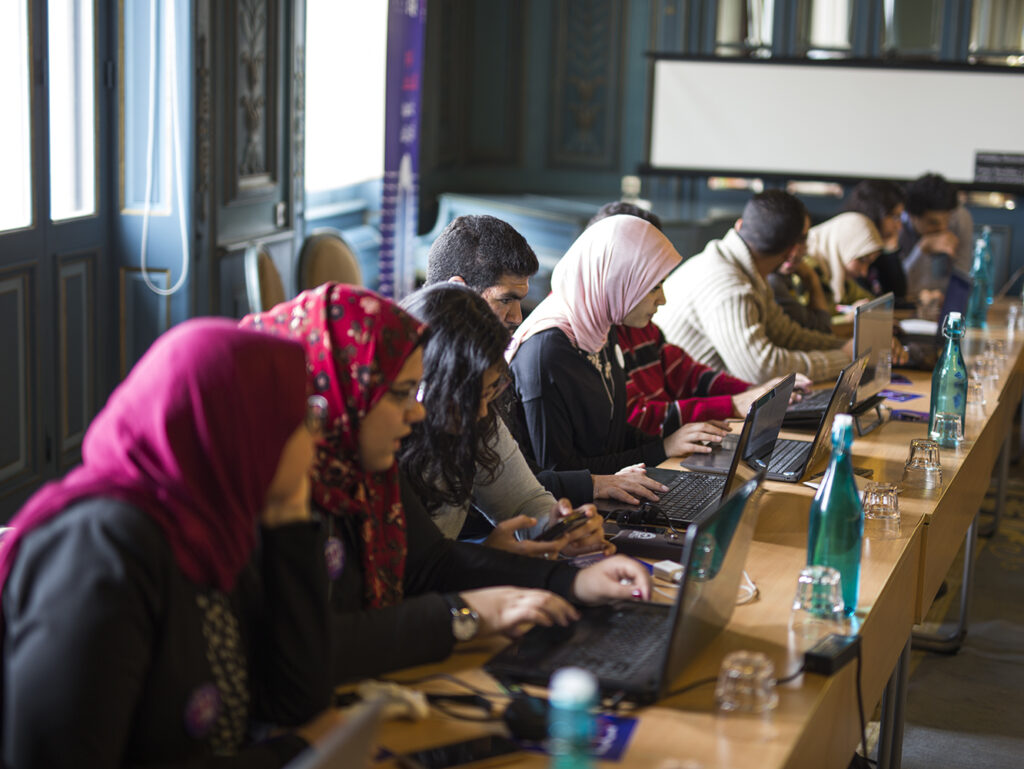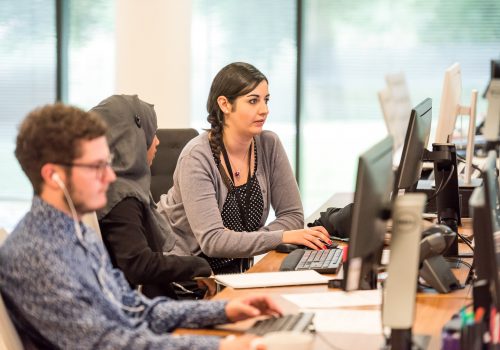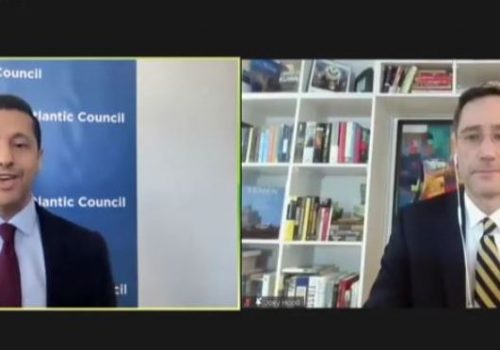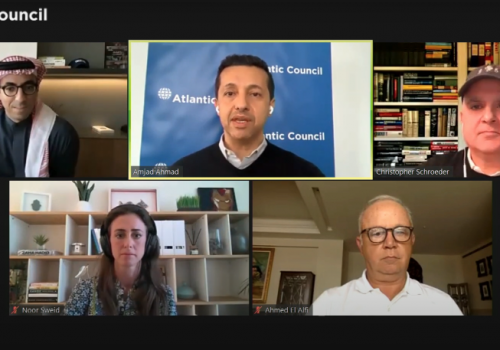‘It’s not a zero-sum game’: MENA officials agree that regional integration is key to growth
On March 16, the Atlantic Council’s empowerME initiative and the King Faisal Center for Research and Islamic Studies co-hosted an event on driving investment in the Middle East moderated by empowerME Director Amjad Ahmad and with opening remarks from Senior Research Fellow and Socioeconomics Unit Head Dr. Mark C. Thompson. Speakers at the discussion included Abu Dhabi Investment Office Director General H.E. Dr. Tariq Bin Hendi, Al Waha Fund of Funds Director & Fund Manager Areije Al Shakar, Saudi Venture Capital Company CEO & Board Member H.E. Dr. Nabeel Koshak, and Sovereign Fund of Egypt CEO Ayman Soliman. The panel discussed strategies for building regional cooperation to create a more attractive investment landscape and productive entrepreneurial ecosystem. Below are the key takeaways from the discussion.
Commitment to increasing entrepreneurship and investments
- Bin Hendi commented on the need to create opportunities for youth given the large demographic imbalance. While it is a risk for the region, it also represents an incredible opportunity for economic growth.
- Koshak noted the role that sovereign funds play in encouraging both local and regional venture capital firms (VCs) to support entrepreneurs and small and medium-sized enterprises (SMEs). By supporting these VCs, Saudi Venture Capital Company effectively provides a green light for other investors to invest as well. The Saudi government is creating a win-win situation with VCs by insisting that they invest in Saudi start-ups and diversify by investing regionally.
- Specific to Egypt, Soliman discussed gaps in the ecosystem in terms of VC and General Partner (GP) incubation for start-ups as well as late-stage growth. An insufficient amount of investment is allocated to growth capital stages. A common assumption is that only international funds can fill these gaps, but they tend to either be unfamiliar with the Middle East and North Africa (MENA) ecosystem or mistakenly assume it follows the Silicon Valley framework. He stressed the need for local financing talent that understands the markets and their cycles and risks.
- To address these concerns, Egypt has committed to expanding SMEs by regulating banks to allocate no less than 25 percent of their loan book to financing that segment. Building the capacity of local SMEs to scale and potentially exit is a priority.
- Bin Hendi emphasized that educating the local and international community on real versus perceived risk is the key to increasing local, regional, and foreign investment.
- Going further, Al Shakar pointed out the importance of increasing the capacity of GPs or fund managers who not only know the nuances of the region but believe in its economic potential. Through Al-Waha’s due diligence process, they can ensure that GPs are high quality and boost foreign investor confidence. She seeks VCs that work well with entrepreneurs, providing them with capital as well as guidance.
- Koshak echoed her stance and pointed out that the Saudi “funds of funds” program looks for similar characteristics when backing GPs.
- In that same vein, Ahmad asserted that VCs need to back emerging managers, as well, because they know the ecosystem better than foreign investors. Educating and priming these entities is vital for long-term growth and the sustainability of the investment industry.
- Soliman agreed and highlighted that 50 percent of investment in the Egyptian stock exchange comes from local and regional partners instead of foreign investors.
- To conclude, Koshak added that unleashing the potential of start-ups and entrepreneurs with high growth potential is key to economic growth. He hopes to see the development of a virtuous economic cycle with more start-ups, available capital, improved regulations, increased ease in doing business, reduced business establishment costs, and more exits. He noted that this vision has already begun to materialize as Jahez is preparing to be the first technology start-up to be listed on Tadawal—the Saudi Stock Exchange.
Importance of regional cooperation and integration
- The Middle East can be a unique economic block given its young and digitally savvy demographic. As Ahmad stated, “It’s not a zero-sum game.” Regional companies can benefit multiple countries and create jobs and wealth that offer region-wide dividends.
- All participants stressed the importance of regional cooperation and integration to drive sustainable economic growth and attract significant international investment. Koshak commented: “The only way to win is to be regional.” Soliman added that sustainable growth cannot be focused on a single economy.
- Bin Hendi agreed and added that it is imperative for the private sector to access the region rather than individual markets. Countries are competing to be the springboard for access to regional markets. The key is not where one is headquartered but to what degree they can access the wider region.
- Soliman stressed that developing capabilities and opportunities will attract international investors by providing the growth capital required to scale SMEs in the real economy.
- As a possible mechanism for increased regional integration, Soliman proposed regional investment committees that focus on growth within the regional economy. Creating a dialogue for a new roadmap on regional integration will create geographic diversification and allow countries to access talent and markets elsewhere.
- While regional integration is far from a reality, Al Shakar emphasized the utility of conversations and relationships with sister organizations in other countries as a temporary solution. By easily connecting entrepreneurs with counterparts in the region, funds can alleviate the fatigue felt by start-ups when operating in various jurisdictions. A collaborative approach to entrepreneurship fosters an environment for start-ups that is more conducive to success across the MENA.
- A solid foundation of communication across geographical lines, compounded with healthy competition, will result in the formal multilateral relationships for which countries are striving.
Need for policy reform
- Bin Hendi stated that non-local agents largely dictate the financial sector in the MENA. He pointed out issues such as maximum rent extraction as it relates to activity in the market versus the real contributive effect that lending institutions have on the market. He argued that policy changes can transfer some of that power back to local agents.
- Bin Hendi then emphasized that dollar-to-dollar direct agreements can facilitate investment in the region while remaining on par with international jurisdiction guidelines. He highlighted that, at times, following the non-traditional route is more conducive to progress, particularly when the regional ecosystem is so distinct from the mainstream.
- Governments should be careful not to over-inflate valuations and make it too simplistic for companies to qualify.
- A proper debt market is a balancing mechanism that should be developed regionally to provide the right support to entrepreneurs. According to Bin Hendi, the United Arab Emirates has already begun that process.
- All panel members unanimously declared that regional competition is healthy and that policy reforms that produce a more seamless ecosystem across borders are critical to unlocking the region’s true potential. Increasing capital flow, regional co-investment, and making room for public-private partnerships are all mechanisms through which this goal can be achieved.
Heba Malik is a participant in the Atlantic Council’s Young Global Professionals Program and an intern at the Rafik Hariri Center for the Middle East and Middle East Initiatives. Follow her on Twitter: @HebaJMalik.

empowerME at the Atlantic Council’s Rafik Hariri Center for the Middle East is shaping solutions to empower entrepreneurs, women, and the private sector and building influential coalitions to drive regional economic integration, prosperity, and job creation.


